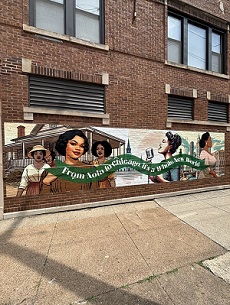
Propaganda
“The mass media serve as a system for communicating messages and symbols to the general populace. It is their function to amuse, entertain, and inform, and to inculcate individuals with the values, beliefs, and codes of behavior that will integrate them into the institutional structures of the larger society. In a world of concentrated wealth and major conflicts of class interest, to fulfill this role requires systematic propaganda.”
Noam Chomsky
Propaganda is psychological conditioning. When we tune in to the nightly news with regularity and view the gratuitous images of Blacks being mistreated, beaten, and killed, we tend to become desensitized to the plight of the Black collective who are the subjects of a disproportionate amount of abuse from America’s state-sanctioned authority.
After awhile the “shock value” diminishes and we come to view these occurrences as just the way things are. The nonsensical is normalized. Once we are completely desensitized to these events, we are less likely to mount a meaningful or effective re-sponse to curb them. Our collective inaction is unnatural, but we are primed to accept certain unfortunate realities. With the advent of cell phone videos, Black death has become akin to American porn, something to watch for a quick hit of delight. The thrill of the kill.
Propaganda is subconscious programming. The subconscious mind has more control over our conscious actions than the conscious mind. It is the subconscious mind that processes what we take in as stimulus every moment we’re awake. It’s what we’ve processed via our five senses. The subconscious also processes the messages we take in subliminally and oftentimes, these are the most potent.
Product advertisers spend millions of dollars infusing their commercials and advertisements with hidden messages, messages only hidden from our eyes. The finished products of our subconscious minds’ consumption are our guiding thoughts. Our actions and behaviors are dictated by the thoughts manifested from our subconscious. We can think of the subconscious mind as the operating system of a computer. It is how we’re hardwired. Within our subconscious mind are housed our personalities, behaviors, and habits, the things that drive
us. Many of the things we do involuntarily or without realizing we’re doing them are the manifestations of our subconscious programming. Often, we perceive these actions as conscious choices, not understanding the work that our subconscious programming played in our preferences.
The subconscious can be programmed for positive behav-ior such as the consumption of media that encourages healthy eating. Alternatively, the subconscious can be rendered toxic. For example, young people consume gratuitous amounts of negative propaganda, veiled as music, which suggests to them that all peer conflict is to be settled with some sort of violent or deadly reaction.
Conditioning
“You can’t listen to all that language and filth without it affecting you”
C. Delores Tucker
There is absolutely no way a Black person can consume years, months, weeks, or days worth of negative media portraying and promoting Black men and women as immoral, ignorant, savage, vulgar, and barbaric and not in some way internalize these images. The person who believes this is possible does not totally grasp how propaganda and subliminal messaging works. While we’re conscious we don’t realize the impact of the gratu-itous consumption of toxic messages. We are not supposed to, but the subconscious absorbs these images and narratives like a sponge. Eventually, the behavior desired by the purveyors of the messages are manifested.
Most of the propaganda we ingest is cleverly cloaked as entertainment. I call it the propaganda “trojan horse.” On the outside, it’s a gift to be embraced, but in reality, it’s waged war in disguise. First, attack how Blacks view themselves and one another. Secondly, dehumanize and demonize Blacks in the eyes of others. These attacks devalue Black people and render them deserving of whatever strife they are targeted with. The only people actively combating Black genocide are Black people. Relatively few of us understand the need to do so. The army defending the minds of Black youth from these sonic attacks is a small one.
In 2020, a lot of us in America and around the globe proudly refer to ourselves and one another as “niggas.” This is the most potent and obvious example of psychological conditioning. For context, consider what would happen if White children or White adult audiences were provided with ample amounts of music, movies, and television programming where they got to hear Whites refer to other Whites as “honkeys” or “crackers” 24 hours a day, 7 days a week? After some time, there’s no doubt we’d hear those words tossed between White people in public spaces at an alarming clip. Unfortunately, this situation has only held true for Black people.
Not only have we come to identify ourselves as niggas, or the hyper-masculine, “real niggas” but Black men have grown extremely comfortable referring to Black women as “bitches” cued by European-owned Black entertainment. Black female artists have “empowered” Black women to refer to themselves as bitches, bad and bossy. The Black community has become one saturated with self-professed niggas and bitches. How’d we go from being subjugated, debased, and disrespected by the most detestable word in the English language to embracing it and wearing it as a badge of honor?
How did so many sisters go from slapping the taste out of a brother’s mouth for directing the word “bitch” at her to proudly placing it on t-shirts and owning it? “If you can make a man think that he is justly an outcast, you do not have to order him to go to the back door. . .he will go without being told; and if there is no back door, his very nature will demand one.” (para-phrased from Carter G. Woodson). Through systemic misedu-cation, we’ve been well-tooled to build our own back doors. At this juncture, far too many of us are mistaking the back door for a front entrance.
Frequently, I hear the cliché employed, “speak it into exis-tence!” This is an acknowledgement of the power words pos-sess. Words possess tremendous power, especially those we use to define ourselves. We’d have to be completely naive to believe that the television, movie and recording industries aren’t aware of this fact.
“Words cannot change reality, but they can change how people perceive reality. Words create filters through which people view the world around them. A single word can make the difference between liking a person and disliking that person.”







